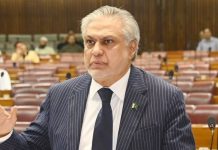—— Asserts ‘not with forces of darkness’
—— Says “Minorities will stay protected in this country”
—— Expresses strong disapproval of elements harming minorities
—— Avers interim set-up does not have ‘perpetual mandate’ to serve nation
—— Tells newly inducted Cabinet that “I am very well aware that we are here for an allocated time”
By Ali Asghar Mubarak
Islamabad: Caretaker Prime Minister Anwaar-ul-Haq Kakar said Friday the interim government would not support the forces of darkness as he took an exception to the violent incidents in Faisalabad’s Jaranwala and on May 9.
Scores of men vandalised churches and attacked the Christian community’s homes in the Jaranwala tehsil on August 16, while Pakistan Tehreek-e-Insaf (PTI) workers resorted to extreme violence in May when their chairman was arrested.
“The minorities will stay protected in this country. There may be an attempt to harm them from a section of marginalised and peripheral group of people, but that would be responded sternly and strictly,” Kakar said during his maiden federal cabinet meeting. “Pakistani state and society [do] not align with such elements. They may be from us but they are divorced from us, they are divorced from our identity process. We do not stand for the forces of darkness,” the interim prime minister said.
The prime minister noted that when one group is in the majority, they should ensure that the minority is protected. “But not on the basis that they would convert to your world view […] their sustenance should be ensured.”
The prime minister and his team are in power for a limited time, but they’re more empowered in terms of decision-making compared to previous caretaker governments as their tenure will last longer.
The polls, which will face a delay as the Election Commission of Pakistan (ECP) will draw up new boundaries by mid-December, will prolong the Kakar-led administration’s tenure for several months.
In his first major step after becoming the prime minister, Kakar appointed a 24-member federal cabinet — 16 ministers, five special assistants to the prime ministers, and three advisers.
Elaborating on his disapproval of the May 9 attacks, the prime minister said he was disappointed with the actions and also noted that people involved in such instances should be dealt with in line with the law.
“These state symbols when they are attacked, the state does not disappear or vanish in a day or two or a week. It’s a process and the initiation of that process, or an attempt at least to do so, was exhibited on May 9.”
“We not just condemn it, now we are in the role to ensure that justice is being done and whosoever violated the laws on those days will be treated by those laws. There won’t be any favour, there won’t be any fear. We will try to implement with justice and neutrality,” he added.
Earlier in his address, PM Kakar had also said the interim government would fulfill national and international commitments made by previous governments, especially mentioning the Special Investment Facilitation Council (SIFC).
Moreover, Caretaker Prime Minister Anwaarul Haq Kakar on Friday acknowledged that the interim set-up did not have a “perpetual mandate” to serve the nation but vowed to do the same nonetheless.
He made the remarks while addressing the maiden meeting of the newly inducted interim cabinet. PM Kakar has installed a 24-member cabinet comprising politicians, TV artists and anchors, retired bureaucrats and servicemen, and one that is apparently dominated by the nominees of PML-N and PPP.
Addressing the cabinet meeting, Kakar began by praising the interim cabinet, saying that he was “proud” to have “one of the best teams”.
“I am hopeful that Almighty Allah would enable us to lead and steer this nation in this interim period. I am very well aware that we are here for an allocated time. We do not have a perpetual mandate to serve this nation,” he said.
PM Kakar said the caretaker set-up will try to lay foundations in order to have continuation of national and international commitments made by previous governments. “And in continuation of that, we will try to support new initiatives, whatever the law and Constitution allow us to do,” the premier said, specifically mentioning the Special Investment Facilitation Council (SIFC).
PM Kakar termed the council “a dream come true”. He said that when he was growing up, it was always stated that Pakistan was an agricultural country with rich mineral resources.
“Hailing from Balochistan, we would take a lot of pride in our natural and mineral resources. But we never knew what those mineral resources were. But the day has arrived, with the support of all institutions — in which the Pakistan military is in the lead — to support, facilitate, encourage and realise this old national dream.”
He said that he personally believed that that this idea was not one of a particular institution. He further said that an institution “may be in the lead role” but the dream was “collectively owned” by the people of this country.
“So we all own it, we all support it and we will all contribute jointly towards it.”




